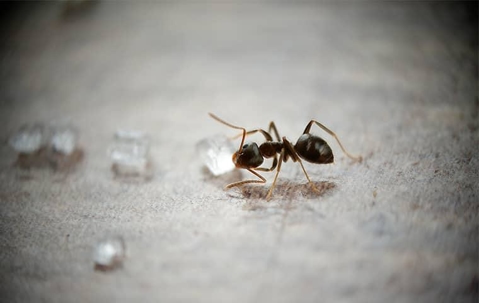Even relatively harmless pests can bring larger problems and unpleasant side-effects to your property. Odorous house ants exemplify this best, with their smelly byproducts and tendency to contaminate food and surfaces. Learning how you can prevent all kinds of pest infestations will help you make sure that you’re never caught by surprise with an ant population that quickly turns sour.
What Are Odorous House Ants?
Odorous house ants are yet another variety of small, black ant that can commonly be found in the home. Just like other foraging ants, they are attracted by food aromas that they can sense from outdoors. Where they differ from the many other kinds of house ants you’re likely to encounter is in the nasty smell that they create. This rotten coconut scent is anything but pleasant, but rather a byproduct of them being smashed or stepped on. The smell alerts other ants to danger and causes human nostrils to turn upward. As if that weren’t bad enough, odorous ants also chew through packaging and crawl all over the areas where we store and eat our food.
Are They Dangerous?
There are two different kinds of ants, the dangerous kinds that pose larger health or property risks and the nuisance kinds that are no less annoying but significantly less hazardous. Odorous ants may fall into this latter category, but you don’t want them around any more than you want other kinds of ants. All of the following are serious problems that odorous ants can contribute to:
Contamination: Ants that forage for food will chew through weak food packaging or scrounge up crumbs in the trash before crawling all over household surfaces. It’s this behavior that makes ants rife for contamination.
Proliferation: Ants reproduce very quickly and in massive numbers. Colonies are specifically designed to dole out jobs to create the greatest effect, including their reproductive queens whose sole job is creating hundreds of more ants.
Other pests: Ants attract other pests, like spiders, that hunt them for food. As with any pest population, the presence of one kind usually precedes another.
House Ant Prevention
To avoid an ant colony from getting out of control, you need to head off problems before they wind up resulting in an infestation. Here are some common ways for every property owner to prevent ant populations:
Food storage: Making sure your food isn’t left out or stored inside of weak packaging.
Cleaning: Deep clean regularly for crumbs and spills, especially under heavy appliances.
Trash storage: Ants will also forage inside of trash cans for their food, so you need your bins to be well-secured both inside and outdoors.
Crack sealing: Frequently checking for and fixing any cracks or holes in your exterior will prevent access points from forming.
Call Professionals For Advice Or Assistance
That’s a whole lot of things to have to consider just to control a few measly ants, but that’s why pest control isn’t something you should try to take on all by yourself. Instead, turn to the experts at Quik-Kill Pest Eliminators for assistance with controlling and preventing ant populations. Our friendly staff can give you more pointers on ways to prevent pests and spot early warning signs. It all starts with an inspection of your property that helps us determine your level of risk and a proper plan of action. If ants or other pests are already growing on your property, let us stop them in their tracks before they pose larger problems.
For comprehensive and effective ant control, trust Quik-Kill Pest Eliminators.

